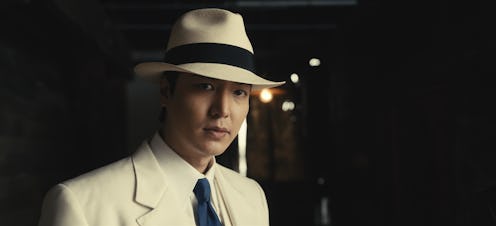Streaming
Pachinko Inspired Lee Minho To Audition For The First Time In 13 Years
The K-drama veteran plays a villain for the first time in his career.

There’s a flicker of danger in Lee Minho’s eyes when he first appears in the Apple TV+ series Pachinko. But decked in a dashing cream suit, it’s easy to forget that the longtime Korean heartthrob is playing a villain – a first in his career. “I liked the fact that he’s not really sophisticated,” the 34-year-old actor tells Bustle of what drew him to his character Koh Hansu, a shifty love interest for heroine Sunja (Minha Kim) who has ties to the Yakuza. “He had to really try hard to survive.”
Pachinko, ultimately, is a tale of just that: survival. Like Min Jin Lee’s bestselling 2017 novel of the same name, the highly anticipated streaming adaptation is a sweeping, emotional saga of a Korean family’s perseverance through Japanese colonialism. Pachinko takes place between 1915 and 1989 and follows the present-day 74-year-old Sunja (Minari Oscar winner Youn Yuh-jung) as she recalls – in flashback format – emigrating from Korea to Japan; her clandestine and short-lived affair with Hansu as a teenager the impetus for her sojourns.
The series’ commitment to Korean history – particularly its depiction of the Zainichi community of ethnic Koreans in Japan – and universal themes resonated so deeply with Lee that he was moved to audition for a role, something he hasn’t had to do in 13 years given his status as a seasoned K-drama veteran in Korea. “When I first saw the show and the script, I thought this was not about a particular history or a particular diaspora,” Lee says. “It’s someone’s mom, it’s someone’s daughter.”
Filming also gave Lee the opportunity to connect with his own family and their history. “I really thought about my mom a lot,” he says, adding that he related to Pachinko’s pivotal scenes in which preparing a meal is depicted as the ultimate symbol of love. “My mom always still cooks for me when I’m home.” Remembering his favorite bowls of kimchi jjigae and doenjang jjigae, he says, “I [still] don’t really like eating alone because I’m so used to having these family dinners and lunches. That experience really is a big part of me.”
On March 25, Pachinko will become the second Korean-language series to debut on Apple TV+, following Dr. Brain. Though Lee has enjoyed almost two decades of success, it’s only in the past few years that a wider global audience has begun to embrace Korean media with the success of Squid Game and the Oscar-winning Parasite. Lee feels “a sense of responsibility” to make sure audiences can see just how special his country’s art is. “I really want to try my best so that more people could love Korean culture.” Given the overwhelmingly positive early reviews of Pachinko, it seems like he’s already succeeded.
This article was originally published on